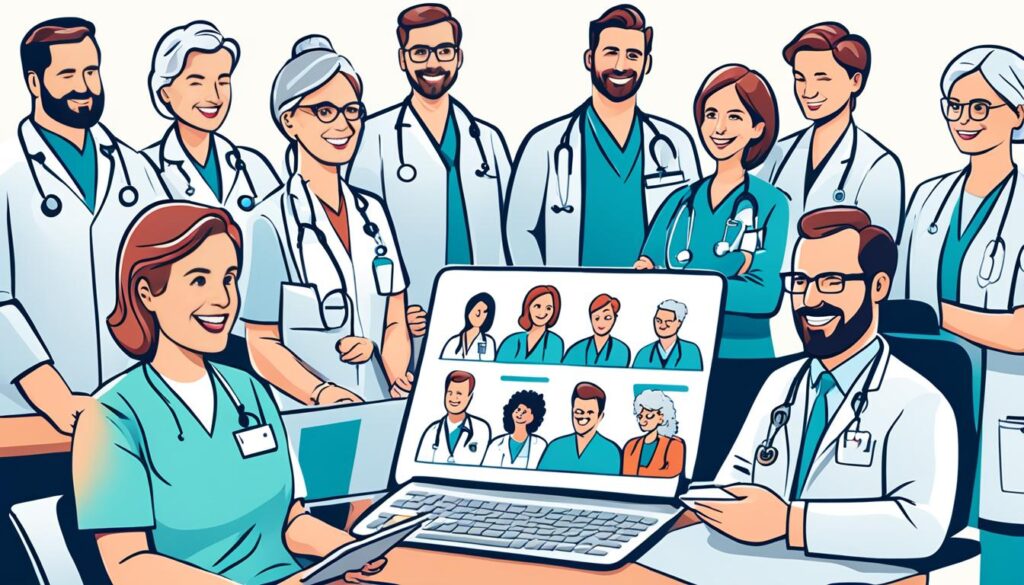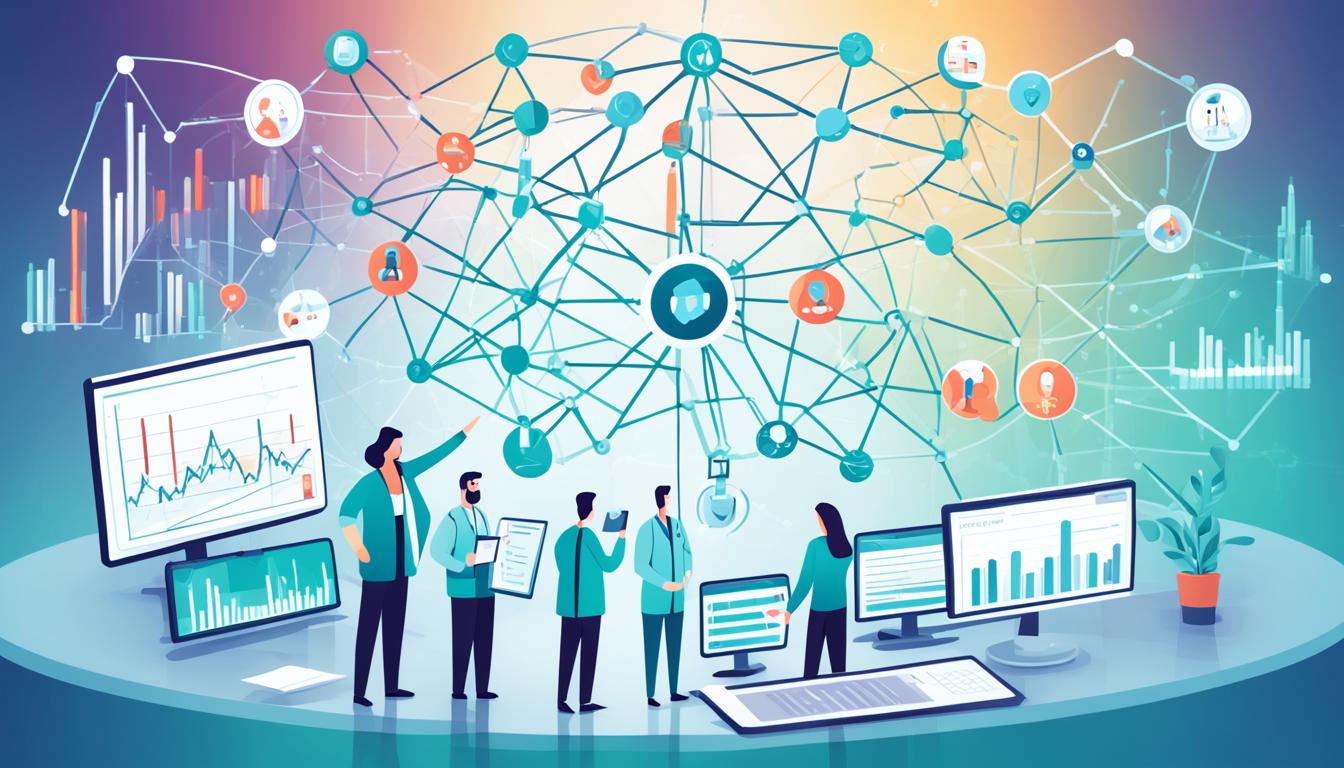Did you know the healthcare industry’s data is expected to soar? By 2020, it could hit about 2,314 exabytes. This massive pool of information is a goldmine for Healthcare Analytics. It heralds a new age of better patient care with Big Data’s help in Healthcare. Diving into Healthcare Data Analysis, we find how properly used data can dramatically improve how we deliver healthcare and the results for patients. The ideas of precision, personalization, and preventive care are now real. They are made possible by analyzing huge amounts of data in the medical world.
Key Takeaways
- Big Data in Healthcare is revolutionizing patient care by enabling personalized treatment and predictive health interventions.
- Healthcare Analytics offers insights that pave the way for a more efficient and effective healthcare system.
- Implementation of Healthcare Data Analysis is key to tackling current and future demographic challenges in patient care.
- The integration of structured and unstructured data is crucial for advancing clinical, administrative, and business analytics in healthcare.
- The recent pandemic has underscored the need for robust digital healthcare support systems.
The Evolution of Healthcare Analytics and Big Data
The transformation in healthcare is a story of change. The old ways are making room for a data-driven healthcare world. The rise of predictive analytics in healthcare marks a big step forward. It shows a future where big data in healthcare is vital.
From Traditional Practices to Data-Driven Healthcare
Old healthcare methods were usually reactive. Now, they’re moving to proactive and predictive models. In places like Poland, healthcare centers are using big data in healthcare more. They’re getting insights that lead to real results. The COVID-19 pandemic pushed this change further. It showed how important digital health data and remote care are for healthcare to thrive.
The Role of Structured and Unstructured Data
Structured data and unstructured data are bringing a new age in healthcare analytics. Their combination allows for deep analysis. This is crucial as healthcare groups aim to use all this data. Understanding both types of data is key to shaping the future of patient care.
Healthcare data insights come from deep analysis of different data types. Combining these data sets opens new doors. It helps find patterns and create models to prevent diseases before they happen. Big data analytics plays a big role in making these advances possible.
| Data Type | Characteristics | Role in Healthcare Analytics |
|---|---|---|
| Structured Data | Predefined schema, Easily quantifiable, Standardized formats | Facilitates easy indexing and straightforward analytics, crucial for EHRs, billing and lab results |
| Unstructured Data | No predefined schema, Text-heavy content, Includes images, notes, and multimedia | Supplements structured data, offering a holistic view of patient information; key for personalized care |
Healthcare is on a journey marked by key changes. Technology and big data are leading to a new health system. The blending of structured and unstructured data through advanced analytics is starting a new era. It’s changing how we achieve excellence in caring for patients.
Big Data’s Impact on Healthcare System Efficiency
Big Data has brought new chances in healthcare, making patient outcomes better with analytics. It has made healthcare delivery more efficient. Big Data helps in creating predictive health models. These are essential in predicting health trends and better disease management.
Improving Patient Care through Predictive Analytics
Predictive health models bring a new age in caring for patients. Thanks to Big Data, early disease detection and treatment have improved. This makes healthcare more efficient and personal. By analyzing data well, healthcare providers can manage health risks better. This means patients get better results.
Managing Healthcare Resources with Data Insights
The management of healthcare resources has changed thanks to data. Now, resources match patient needs more accurately. Making decisions based on healthcare data helps use resources better. This improves efficiency and cuts costs. Patients enjoy smoother experiences, and resources aren’t wasted.
Data is key in planning for patient care needs and in managing health systems. It helps leaders use scarce resources well. With data, the most important services reach those in need, at the right time and place.
It’s crucial for healthcare organizations to use Big Data well. This ensures care quality improves. As resource management gets better, using data well will mark the best healthcare systems. These systems will be modern, efficient, and effective.
Technological Advances and Innovation in Healthcare Analytics
The healthcare industry is always changing thanks to new tech. Tools like Electronic Health Records (EHR) and smart artificial intelligence algorithms are leading the way. They are changing how we look at healthcare data and patient care.
Healthcare providers are now using machine learning to make sense of data. They’re creating a healthcare system that can predict illnesses and prevent them. This approach uses detailed healthcare data analysis techniques. It looks at patterns, predicts health issues, and makes treatments that fit each patient.
Why is healthcare data management so important? The amount of data in healthcare is growing fast. This creates a need for strong systems to handle it all. These systems ensure that patient information is stored, accessed, and analyzed safely and efficiently.
Advancements in healthcare technology offer a beacon of hope for addressing perennial challenges in medicine. With each innovation, we edge closer to a future where healthcare delivery is proactive, personalized, and predictive.
- Integration of EHR for personalized patient histories
- Artificial Intelligence and Big Data in predictive diagnostics
- Machine Learning for customized treatment plans
- Robust data management systems for enhanced security
Technological innovation in healthcare means finding the right balance. It’s about balancing deep analysis with protecting patient privacy and ensuring precise care. Moving forward, focusing on advanced healthcare data management will not only better healthcare services. It will also help organizations keep up in the fast-changing digital healthcare field.
Patient-Centered Analytics: Enhancing Individual Healthcare
In modern healthcare, there’s a big move towards patient-centered healthcare. It treats everyone as unique, with their own health needs and stories. This approach comes alive with personalized medicine. It uses predictive analytics in healthcare to customize treatments for each person, aiming for comprehensive patient care. By mixing healthcare data and smart patient data analysis, doctors can get a better idea of a patient’s health. This greatly improves how personal and effective medical treatment can be.
Personalized Medicine and Predictive Health Models
Personalized medicine changes how we treat and prevent diseases. It looks at what makes people different, like genes, surroundings, and how they live. When predictive analytics in healthcare meets real-life care, great things happen. Doctors can look at medical history, DNA, and life habits to spot health risks early. They can then stop problems before they start. This boosts care for everyone and raises the care quality in the health system.
Integrating Patient Data for Comprehensive Care
Comprehensive patient care means bringing together lots of different data. Electronic Health Records (EHRs) are now vital. They collect all types of data, from X-rays to lab results and doctor’s notes. This creates a full story of a patient’s health journey. Integrating healthcare data means every choice about care is based on a complete view of the patient. This way, the care given helps the person as a whole, aiming for better individual health.

As digital health records and fancy data analysis get better, truly personalized healthcare is becoming a reality. Using smart algorithms and improving how we mix data will keep making patient-centered analytics better. It’s leading to a future where care is quick to react, forward-thinking, and made just for each person’s needs.
Optimizing Outcomes with Healthcare Data Management
Big Data’s growth in healthcare is changing how we handle data. This shift emphasizes the need for improved scalability and accuracy in data management.
Challenges in Data Collection and Storage
The growth in Healthcare Data Collection has led to significant Data Storage Challenges. Organizations work hard to collect all essential information. The real value of large datasets comes from not just gathering, but smartly managing them.
Healthcare Data Management systems must now be more creative and flexible. They need to handle Big Data Challenges, like mixing different data types and keeping data integrity from many sources.
Ensuring Data Security and Privacy
In today’s world, keeping Data Security in Healthcare is constantly challenged. Providers need to use strong Data Protection strategies to keep Patient Data Privacy. This means using solid encryption, controlling access, and securing networks.
Following rules like HIPAA is only the start. Building a culture that keeps improving data security is key. This way, protecting healthcare data becomes an ongoing effort. It requires constant vigilance and resources to fight against cyber threats.
Healthcare Analytics: Unlocking the Power of Big Data for Better Outcomes
The field of Healthcare Data Analysis is changing fast, thanks to Data-driven Healthcare. This change lets healthcare providers meet patient needs better by using Big Data. It is changing how healthcare systems work. Now, it’s easier to plan patient care, improving treatment quality.
Healthcare Data Analysis is more than just collecting lots of data. It’s about carefully studying the data to find useful insights. These insights help with Improving Patient Outcomes with Analytics. They lead to better diagnosis, predictive healthcare, and smoother operations in healthcare.
Improving patient health and making operations efficient are main goals. By using advanced analytics, doctors can know patient needs early and customize their care. This matches the goal of precision medicine. It makes healthcare sharper in treating and predicting health issues before they happen.
In the bigger picture of improving healthcare, Big Data is key. It makes patient care stronger by helping to understand data better. This understanding helps simplify complex health issues. It leads to treatments that save money and focus on results.
“In the nexus of healthcare innovation, Big Data is the beacon guiding us toward a future where every patient interaction and medical intervention is informed, intentional, and individualized.”
- Enhanced Diagnostics and Treatment Strategies
- Predictive Analytics in Patient Care
- Integrated Data Systems for Holistic Healthcare
- Cost Reduction through Targeted Care Delivery
Healthcare analytics is here to stay. It’s a main support for future healthcare systems. It means a future where data informs all care decisions, making Improving Patient Outcomes with Analytics a standard practice.
Utilizing Big Data in Healthcare for Population Health Management
Healthcare systems worldwide use Population Health Management. Big Data in Healthcare is essential. It lets us see a full picture of health, moving from treating sickness to stopping it before it starts. Healthcare Analytics for Prevention is changing health initiatives and how we give and manage care.
Analytics in Disease Surveillance and Prevention
Disease Surveillance with Big Data is key for stopping and controlling infections. It helps spot trends early to prevent outbreaks. By analyzing patient records and other data, we can act fast to stop diseases.
Addressing Public Health Crises with Data-Driven Decisions
In recent years, Public Health Crisis Management has shown the power of Data-Driven Decision Making. During the COVID-19 pandemic, Big Data tracked the spread and helped shape responses. It analyzes health data to improve Healthcare Crisis Response plans.
Here’s a table showing how Big Data helps in health crisis management:
| Big Data Application | Impact on Healthcare Operation |
|---|---|
| Real-time Disease Surveillance | Facilitates immediate response and containment efforts |
| Pattern Recognition in Population Health Data | Identifies at-risk groups for preemptive action |
| Predictive Modeling for Resource Allocation | Optimizes the distribution of medical supplies and personnel |
| Analysis of Treatment Efficacy | Improves patient outcomes through evidence-based practices |
| Data Sharing Among Healthcare Entities | Encourages collaboration for unified crisis management |
In summary, Big Data is a game-changer in health management. It helps our healthcare systems stay ahead, adapt, and provide better care.
Demystifying Healthcare Data: Methods and Tools
The healthcare world is quickly changing, thanks to new Big Data Analytics Methodologies and Healthcare Data Science. There’s a lot of data being created every day. This data helps improve how we care for patients. Now, understanding complex data is crucial for making healthcare better.
Big Data Analytics Methodologies
At the leading edge, Big Data analytics helps make sense of massive healthcare data. It uses powerful systems, like Hadoop, and Analytics in Healthcare to pull out useful information. This helps in making smart decisions. AI and machine learning let analysts uncover insights. These insights improve diagnoses, treatment plans, and the financial side of healthcare.
The Growth of Healthcare Data Science and Analysis Techniques
As more healthcare data becomes available, Data Science Growth in healthcare is booming. This field is creating new ways to handle and understand large healthcare data. With new Healthcare Data Analysis Techniques, professionals can use complex data better. This helps improve patient care and healthcare management.





